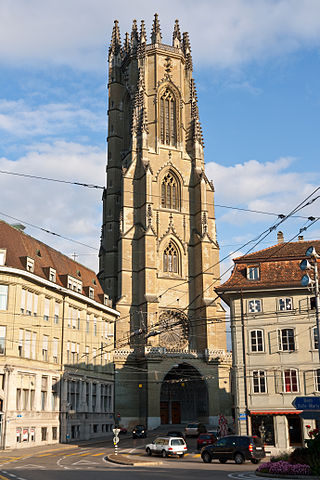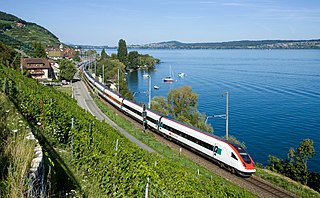
Servette FC is a Swiss professional football club based in Geneva, founded in March 1890 with rugby as its first sporting activity, and named after the Geneva district of the same name. The football section was created on 17 January 1900. They play in the Swiss Super League.

CS Bourgoin-Jallieu is a French rugby union club competing in the third level of the French league system, Nationale.

Stade de Genève, also called Stade de la Praille, is a stadium in Lancy, Canton of Geneva. It has a capacity of 30,084.

The Genève-Servette HC is a professional ice hockey club based in Geneva, Switzerland and competing in the National League (NL), the top tier of the Swiss hockey league system. The team plays their home games at the Patinoire des Vernets, which has a seating capacity of 7,135.

The Diocese of Lausanne, Geneva and Fribourg is a Latin Catholic diocese in Switzerland, which is exempt. The original diocese of Lausanne was a suffragan of the archdiocese of Besançon, through the 18th century. The diocese of Geneva was a suffragan of the archdiocese of Vienne.
The Swiss Rugby Federation ) is the governing body for rugby union in Switzerland.
Christopher Philip Wyatt is a Welsh international rugby union player whose career as a lock forward lasted from 1998 to 2003, during which he attained 38 caps for the Wales national rugby union team.
The West Switzerland Company was a railway company in Switzerland, formed 1854 and absorbed into the Western Swiss Railway in 1872. The OS built a railway network in western Switzerland and connected with France via Geneva in 1858, although Switzerland's first railway was the French Strasbourg–Basel Railway, which connected Basel with Strasbourg, France in 1844.

The Jura Foot Line or Jura South Foot Line, is a railway line in Switzerland. It runs from Olten along the foot of the southern Jura range through Solothurn, Grenchen, Biel/Bienne, Neuchâtel, Yverdon-les-Bains and Morges to Lausanne. It is one of two routes used by intercity trains between Geneva and Zürich. The other is the Midland line which connects Olten via Langenthal, Burgdorf, Bern, Fribourg, Lausanne to Morges. The line was built by five railway companies, which after several mergers were absorbed into the Swiss Federal Railways in 1903.

In Switzerland, most of the people have a regular sport activity and one in four is an active member of a sports club. The most important all-embracing organisations for sports in Switzerland are the Federal Office of Sport, and the Swiss Olympic Committee.

Rugby Club CERN - Meyrin - St Genis are a semi-professional Swiss rugby union club situated on the French–Swiss border, 5 kilometres (3.1 mi) northwest of Geneva. The club plays in the Swiss first division where it is one of the most successful teams in the country's history, behind Hermance RRC.
Nyon Rugby Club is a Swiss rugby union football club based in Nyon, situated on the shores of lake Geneva between Geneva and Lausanne. The club was founded in 1972 and is a member of the l'Association des Sociétés Sportives Nyonnaises, the Association Vaudoise de Rugby and the Swiss Rugby Federation. They play their home matches at the Colovray Sports Centre which is under the management of UEFA. Since its creation, Nyon Rugby Club has won the national championship and cup several times and has provided many players to the Swiss national side

The Cinémathèque suisse, formerly the Archives cinématographiques suisses, is a Swiss state-approved non-profit foundation headquartered in Lausanne. It aims to collect, protect, study and present film archives. The Swiss Cinematheque has its archives in Penthaz and a branch office in Zürich.
Xavier Oberson is ordinary professor in Swiss and international tax law at the Faculty of Law at the University of Geneva since 1994. He is also the founder and director of the LL.M. Tax at the University of Geneva.
The 1932–33 season was the Fussball Club Basel 1893's 40th season in their existence and their 33rd consecutive season in the top flight of Swiss football. They played their home games in the Landhof in the district Wettstein in Kleinbasel. The club's chairman Franz Rinderer was confirmed at the AGM for the second consecutive period.

The Swiss Private Bankers Association is a Swiss trade association made up of banking institutions that meet the legal definition of a private banker according to Swiss law. It is based in Geneva, Switzerland, and currently has six members.

The Lausanne–Geneva railway is a double-track main railway line in Switzerland. It is an important for passenger transport and is the most frequented railway in Romandy. It serves as an approach from Geneva to the Simplon Railway and the line to Bern and Zürich.

FC Stade Lausanne Ouchy, sometimes referred to as SLO, is a Swiss football club based in Ouchy, Lausanne. They will play in the Challenge League from 2024 after relegation from Super League in 2023–24.
Video games in Switzerland have been released since the 1980s. In 2016, there were between 100 and 120 game companies, mostly small, corresponding to about 500 employees and a turnover of about 50 millions Swiss francs.












